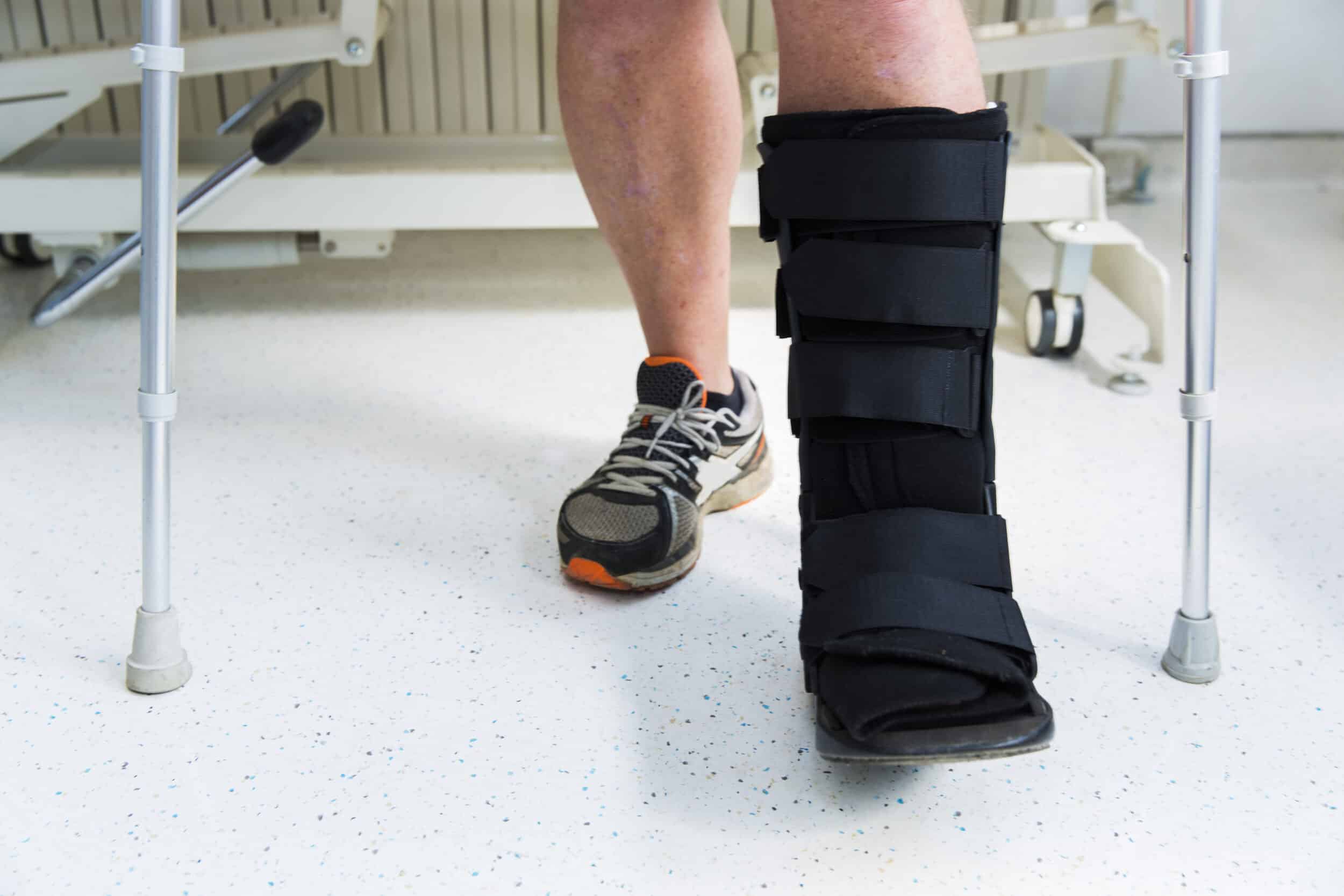If you’re dealing with foot or ankle pain, injuries, or ongoing discomfort that impacts your daily life, Advanced Orthopaedic Associates is here to assist you.
Our fellowship-trained and board-certified orthopedic specialists diagnose and treat foot and ankle conditions. They provide advanced surgical and nonsurgical services to help patients in Wichita, Wellington, and Winfield, Kansas, regain their mobility.

Common Foot & Ankle Conditions We Treat
Foot and ankle problems can severely limit your ability to stay active, even making regular daily tasks uncomfortable and difficult. We treat a wide range of these conditions, including:
- Plantar Fasciitis: This common condition causes heel pain and stiffness, especially in the morning. It’s often caused by inflammation of the tissue connecting your heel to your toes.
- Bunions: Bunions are painful bony bumps at the base of the big toe. They can make it difficult to wear shoes or walk comfortably.
- Achilles Tendon Injuries: These injuries often occur in active individuals and can be minor strains or complete ruptures of the tendon.
- Ankle Fractures: Broken ankles can result from accidents, sports injuries, or falls. Proper diagnosis and treatment are essential for healing and preventing complications.
If you’re experiencing foot or ankle pain, swelling, or reduced mobility, don’t ignore it. Our team will evaluate your condition and create a personalized treatment plan that works for you.
What to Expect During Surgery
Foot and ankle surgery will vary depending on the type of procedure you need, but we know that understanding the general process can help you feel more prepared.
Most foot and ankle surgeries are performed on an outpatient basis, meaning you’ll likely go home the same day as your procedure. However, more complex surgeries or those involving significant reconstruction may require an overnight stay in the hospital. Here's what you can expect before, during, and after:
- Before Surgery: Your surgeon will provide clear instructions to help you prepare, which may include fasting the night before your procedure and arranging for someone to drive you home. On the day of your surgery, you’ll meet with your care team to review your procedure and ask any last-minute questions.
- During Surgery: Depending on the type of surgery, the procedure may take anywhere from one to several hours. Local, regional, or general anesthesia will keep you comfortable throughout. We will try to use minimally invasive techniques whenever possible to reduce the size of incisions and speed up recovery time.
- After Surgery: You’ll be moved to a recovery area where your care team will monitor you as the anesthesia wears off. Once you’re stable and comfortable, you’ll receive detailed post-operative instructions, including how to care for your surgical site, manage any discomfort, and follow weight-bearing restrictions if needed.
Post-Surgical Care and Rehabilitation

Recovering from foot or ankle surgery takes time, but our team will support you every step of the way.
- Follow-Up Appointments: We’ll schedule regular visits to monitor your healing progress and make any necessary adjustments to your recovery plan.
- Physical Therapy: Physical therapy is often a key part of your recovery. Our specialists will guide you through exercises to restore strength, flexibility, and mobility.
- Personalized Recovery Plans: Every patient’s recovery is different. We’ll work with you to create a plan that fits your needs and helps you return to your normal activities.
Comparing Surgical vs. Non-Surgical Treatment Options
Advanced Orthopaedic Associates offers both surgical and non-surgical treatments for foot and ankle conditions. Conservative care options, such as physical therapy, bracing, orthotics, and platelet-rich plasma (PRP) injections, can be highly effective for many injuries and degenerative conditions.
These conservative approaches focus on reducing pain, improving mobility, and supporting the body’s natural healing process without requiring surgery.
You may need surgery when non-surgical treatments stop working or when a serious structural issue exists, such as a complete Achilles tendon rupture, where the tendon tears in two.
Surgical procedures can also address issues like severe fractures, advanced arthritis, or significant deformities.
Surgery may take longer to recover from, but it can restore stability, alignment, and function beyond what non-surgical methods can achieve. Our experts tailor each treatment plan to the patient’s needs, ensuring the best possible outcome regardless of approach.
Foot Surgery for Athletes: Return-to-Play Timelines
Athletes recovering from foot and ankle surgery are often highly motivated to return to their sport quickly. Recovery timelines depend on the type of surgery performed, the severity of the injury, and the athlete’s conditioning before the procedure.
Minor procedures may allow a return to light training within a few weeks, while complex reconstructions may require several months before full participation is possible.
Our sports medicine and surgical teams work closely with athletic trainers, physical therapists, and coaches to develop a sport-specific rehabilitation plan. This ensures a safe and effective return-to-play process that balances performance goals with long-term joint health.
Injury Prevention After Foot and Ankle Surgery
Preventing re-injury after surgery is essential for protecting your results. A few key aspects of this are:
- Strengthening exercises for the foot, ankle, and lower leg help maintain stability and balance.
- Flexibility training and proper warm-up routines can reduce strain on healing tissues.
- Supportive footwear tailored to your activity level and biomechanics also plays a key role. Specialized footwear and bracing are often used after surgery to protect the surgical site and support healing. Walking boots, post-op shoes, and custom orthotics can help offload pressure and maintain proper alignment. In some cases, an ankle brace can provide stability during the transition back to regular shoes.
Our rehabilitation programs focus on building strength, improving movement patterns, and educating patients on safe activity progression to minimize the risk of future injuries.
How to Choose the Right Foot & Ankle Surgeon in Wichita, Wellington, & Winfield, KS
Choosing the right surgeon is an important decision for both surgical and non-surgical treatment. Look for a specialist with advanced training in foot and ankle care, a strong record of successful outcomes, and experience treating a wide range of conditions.
A surgeon who offers both conservative and surgical options can provide balanced recommendations tailored to your needs. At Advanced Orthopaedic Associates in Wichita, we combine extensive expertise, advanced technology, and personalized care to deliver high-quality foot and ankle treatment for every patient.

Why Choose Our Foot & Ankle Specialists
At Advanced Orthopaedic Associates, our specialists have extensive training in foot and ankle care.
Dr. John A. Childs, DO: Dr. Childs is a fellowship-trained orthopedic surgeon specializing in foot and ankle disorders. With a focus on innovative care, he has been helping patients in Wichita and beyond since 2019.
Dr. John W. Fanning, MD: Dr. Fanning has over two decades of experience in foot and ankle surgery. Born and raised in Wichita, he combines local roots with exceptional training, making him a trusted choice for patients in the community.
Whether you're dealing with an injury, chronic pain, or mobility challenges, our specialists are dedicated to helping you find relief and get back to the activities you enjoy.
Frequently Asked Questions
Persistent pain, swelling, or difficulty walking are signs that surgery may be necessary. If conservative treatments aren’t helping, it’s time to consult a specialist.
Your physician will assess your condition and explore non-surgical options first. Surgery is only recommended when other treatments aren’t effective.
Yes, our team specializes in both surgical and nonsurgical treatments, ensuring the best approach for your specific needs. Whether you’re dealing with a mild injury, chronic pain, or a more complex condition, we explore conservative treatments first and recommend surgery only when necessary.
As with any surgery, foot and ankle procedures can have some risks, but they are rare. Potential risks include infection, blood clots, nerve or blood vessel injury, delayed healing, or residual pain or stiffness. Adverse reactions to anesthesia are also possible but uncommon.
Our surgeons take every precaution to minimize these risks and ensure your safety. Feel free to discuss any concerns with us during your consultation.
Recovery can range from a few weeks for minor procedures to several months for complex reconstructions. Your surgeon will provide a personalized timeline based on your surgery and overall health.
Yes. Surgical procedures can address structural problems, relieve pain, and improve function in conditions such as flat feet, bunions, hammertoes, and arthritis.
Your surgeon will evaluate your condition, review imaging, and discuss your symptoms to determine the best approach. Conservative treatments are usually the first-line approach before considering surgery.
This depends on the type of procedure and your healing progress. Some patients may walk with assistance in a few days, while others require longer immobilization. Driving is typically safe once you can operate the pedals comfortably and are no longer taking pain medication. Your surgeon guides you with a customized return-to-activity plan.
Yes. When appropriate, minimally invasive techniques are used to reduce scarring, minimize discomfort, and shorten recovery time.
Schedule Your Consultation and Get Back on Your Feet
Don’t let foot or ankle pain hold you back any longer. Call Advanced Orthopaedic Associates at (316) 631-1600 to schedule your consultation today. Our specialists are here to provide the care you need to regain strength and mobility.
